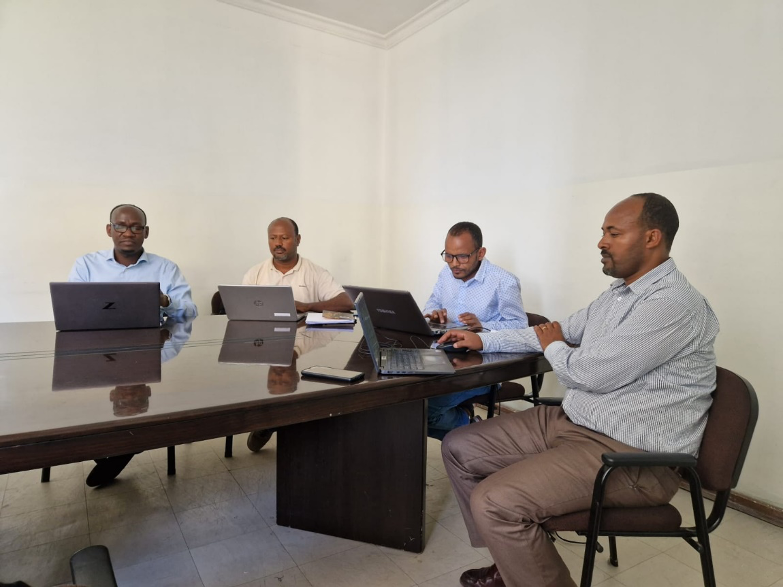From Right to Left: Degu Jerene (KNCV TB Foundation Netherlands), Demelash
Assefa (KNCV TB Foundation Ethiopia), Amtatachew Moges (NTP Data Manager,
Ethiopia), Zewdu Gashu (Management Sciences for Health, Ethiopia)
The global Tuberculosis (TB) epidemic remains a significant public health challenge, with high-burden countries disproportionately affected. In these settings, policymakers are faced with the daunting task of developing and implementing effective TB control strategies to address the epidemic. In recognition of this challenge, the Patient Centered Framework (PCF) approach has been developed as a comprehensive, evidence-based method to improve the quality of TB care and control.
One country that has begun using the PCF approach is Ethiopia. In January 2023, the country is undertaking a mid-term review of their National Strategic Plan (2020-2025) for TB control. As part of this review, the National TB Program (NTP) has decided to use the PCF approach to inform the update of their NSP. This approach is a comprehensive, evidence-based method that focuses on the needs of patients and communities to improve the quality of TB care and control.
Mr Taye Letta, the National Tuberculosis Program Manager and Deputy Director Health Promotion and Disease Prevention Directorate in Ethiopia is leading this process. The PCF approach is being used in Ethiopia to help identify the root causes of TB, prioritize interventions, and optimize resource allocation. The PCF dashboard will support the data consolidation process, providing a comprehensive understanding of the TB situation in the country. The PCF handbook will guide root cause analysis, intervention identification, and prioritization based on impact and feasibility. This will help to ensure that the NSP is patient-centric and addresses the needs of the most vulnerable populations.
One of the key benefits of using the PCF approach in Ethiopia is that it will help to ensure that the National Strategic Plan is evidence-based and data-driven. The data consolidation process provided a detailed understanding of the TB situation in the country, including information on TB incidence, mortality, and treatment outcomes. This information was used to identify gaps in service delivery and target interventions where they are most needed. Another benefit of using the PCF approach is that it will help to ensure that the NSP is inclusive and considers the needs of different stakeholders. The stakeholder consultative workshop will bring together representatives from different sectors, such as healthcare providers, community groups, and government agencies, to gain consensus on the evidence collected along the care continuum. This will help to prioritize problems, root out causes, and identify and optimize interventions.
The PCF approach will also help to ensure that the NSP is cost-effective. The intervention costing process will identify the unit costs of interventions, which will be used as building blocks for the overall costing of the NSP. This will help to ensure that resources are allocated to the most cost-effective interventions.
Finally, the PCF approach will help ensure the NSP is sustainable. The investment business case will model the impact and cost of the prioritized interventions for optimization. This will help to identify the most cost-effective interventions and target resources where they will have the greatest impact.
The use of the PCF approach in Ethiopia’s mid-term review and NSP update is a significant step towards improving the quality of TB care and control in the country. By using an evidence-based, data-driven, inclusive, cost-effective, and sustainable approach, the NTP can ensure that the NSP addresses the needs of patients and communities and leads to a reduction in TB incidence and mortality.
However, Ethiopia is not alone in this journey, many other countries are facing the same challenges and are in need of similar support. That’s why the PCF Learning Hub offers a wide range of services and resources to support policymakers in high-burden TB countries in effectively tackling the epidemic and achieving better outcomes.
Our online resources provide a streamlined, efficient way for policymakers to develop and implement their TB strategy and programs. From data consolidation and program review to program evaluation and intervention optimization, our resources cover all the key steps of the PCF approach. Our team of experts is also available to provide guidance and support every step of the way.
We understand that policymakers are often faced with limited resources and a lack of technical expertise. That’s why we provide customized solutions to meet the specific needs of each country. Our goal is to empower policymakers with the knowledge and resources they need to achieve better outcomes in the fight against TB.
In conclusion, the PCF approach is a comprehensive, evidence-based method that focuses on the needs of patients and communities to improve the quality of TB care and control. By using the PCF approach, policymakers in high-burden TB countries can achieve better outcomes in the fight against TB. Our team of experts and online resources can provide support and guidance throughout the process and help policymakers to develop and implement effective TB control strategies that address the needs of patients and communities. We believe that by providing better knowledge and resources, we enable policymakers to achieve better outcomes in the fight against TB.
In Ethiopia’s case, the use of the PCF approach in the mid-term review and NSP update is a significant step towards improving the quality of TB care and control in the country. By using an evidence-based, data-driven, inclusive, cost-effective, and sustainable approach, the NTP can ensure that the NSP addresses the needs of patients and communities and leads to a reduction in TB incidence and mortality.
To find out how your country can get started using the PCF approach for TB programming, please contact Egwuma Efo (egwuma.efo@kncvtbc.org), Degu Dare (degu.efo@kncvtbc.org)
